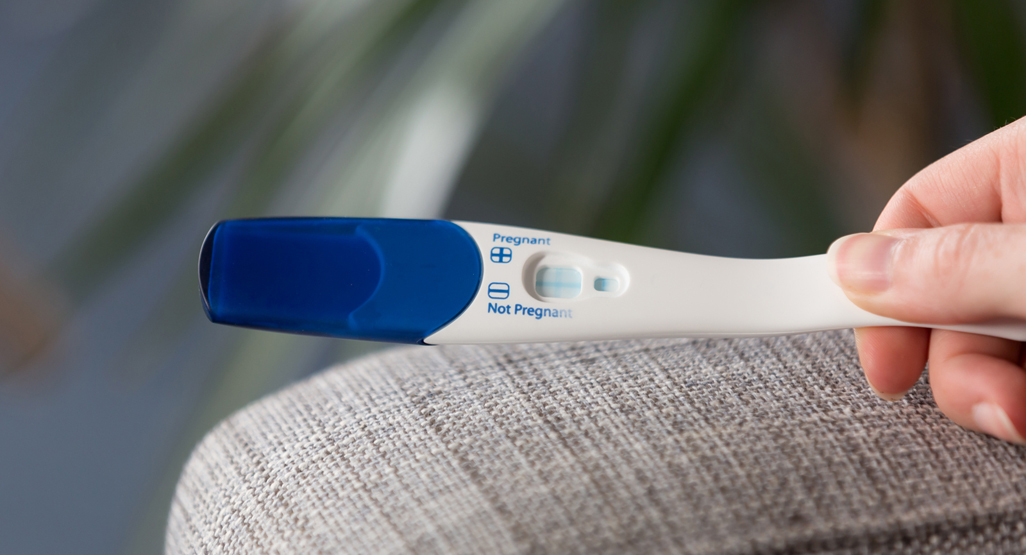You know how to use them, but how exactly do they work?
A home pregnancy test detects the presence of the pregnancy hormone, human chorionic gonadotrophin (hCG), in your pee.
Your body starts to produce hCG when a fertilized egg implants in your uterus. HCG is secreted by the cells which will go on to form your baby’s placenta. It can be detected in your urine from about six to 14 days after fertilization (Nepomnaschy et al 2008).
In the first few days after implantation, your levels of hCG rise very quickly. Most home pregnancy tests are sensitive enough to detect hCG in your urine on the first day your period is due.
If you have a negative result when you first test, it doesn't necessarily mean you're not pregnant, it may just be that the amount of hCG has not yet reached a level high enough to be detected. Sometimes levels may still not be high enough to detect on the day your period is due (FSRHCEU 2009, Nepomnaschy et al 2008). If your period is late, and the result is negative, wait a few days then test again.
You will find some pregnancy tests are more sensitive than others. The most sensitive tests can tell you’re pregnant even if you have only a small amount of hCG in your system.
You can find out how sensitive a home pregnancy test is by reading the info leaflet that comes in the test box. You'll see that concentrations of hCG are reported in milli-International Units (mIU) per millilitre. So for example, a test with a sensitivity of 20 mIU/ml is more sensitive than one with a sensitivity of 50 mIU/ml.
Advertisement | page continues below
When should I test?
Most tests can tell whether you’re pregnant on the first day of your missed period. The more sensitive tests may be able to detect low levels of hCG a few days before your period is due. However, testing this early may not give you an accurate result (see below).
Advertisement | page continues below
Depending on the test you’re using, you can test at any time of day. When you decide to test, try not to drink too much beforehand, as it could dilute the levels of hCG in your urine.
Some tests may recommend that you use the first urine of the day, particularly when testing early. Levels of hCG become more concentrated in your urine overnight, because your pee isn't watered down.
If you have
irregular periods, it may be harder to calculate when your period's due. Allow for your longest cycle in recent months before testing.
If you've recently
stopped taking the pill, you may not know how long your natural cycle is, and may end up testing either too soon or too late. If your test is negative, you should test again in three days.
How do I use a home pregnancy test?
First, read the directions carefully, because the instructions will vary with different brands.
Advertisement | page continues below
For many tests, it’s as simple as peeing on a test stick. For others you may have to catch your urine in a small cup, and dip a testing strip into your sample. Or, you may be given a dropper to place a small sample into a testing well.
How test results are displayed can vary too. Some show pink or blue lines on the test strip. Others reveal a plus or minus sign, or change the colour of your urine sample. Digital tests display the words 'pregnant' or 'not pregnant' in a window, and some may give an estimate of how many weeks ago you conceived.
How long does it take to see the results?
Check the instructions with your test, but you should see the results in about three to five minutes. It can feel like the longest wait ever!
If you’re testing in the bathroom, you may want to go to another part of the house, and find something to do as a distraction.
Are home pregnancy tests accurate?
Home pregnancy tests are accurate if you follow the directions to the letter (NHS Choices 2010). Having said that, some tests are more sensitive, and easier to use and interpret, than others (Tomlinson et al 2008, Wallace et al 2009).
Advertisement | page continues below
There are several reasons why a home pregnancy test may be negative. You may not be pregnant, or you may not be making hCG at a level that a urine test can detect yet.
If you test too early, before the first day of your missed period, you may get a false negative result because not enough of the hormone has built up in your system
(FSRHCEU 2009, Nepomnaschy et al 2008).
If the test comes back negative but you still suspect you’re pregnant, wait at least three days, and try testing again.
Is it possible to get a false positive?Advertisement | page continues below
False positives, when the test says you’re pregnant but you’re not, are rare but not impossible. Some fertility drugs, which contain hCG, may affect the test results
(NHS Choices 2010). (
Over-the-counter-medicines, such as
acetaminophen , should not.)
Where can I buy a pregnancy test?
You can buy pregnancy tests, without prescription, at most pharmacies.
Many doctors use home pregnancy tests to confirm pregnancies, in which case they’re exactly the same.
Occasionally, women are given blood tests, which also test for hCG, but to an exact level. A blood test is much more sensitive than a urine test. It can tell whether you’re pregnant as soon as your fertilized egg has implanted. This could be as early as six days after you ovulate (Nepomnaschy et al 2008).
You may have a blood test to get a better idea of what is happening in very early pregnancy (before an ultrasound can pick up on a pregnancy). It can help detect an ectopic, molar or possible chemical pregnancy. It’s a good way to detect that the level of hCG is rising in a way expected for a healthy pregnancy.
Take our quiz
Would you like a quick and easy way to figure out if you’re pregnant? Take our quiz!
Advertisement | page continues below



